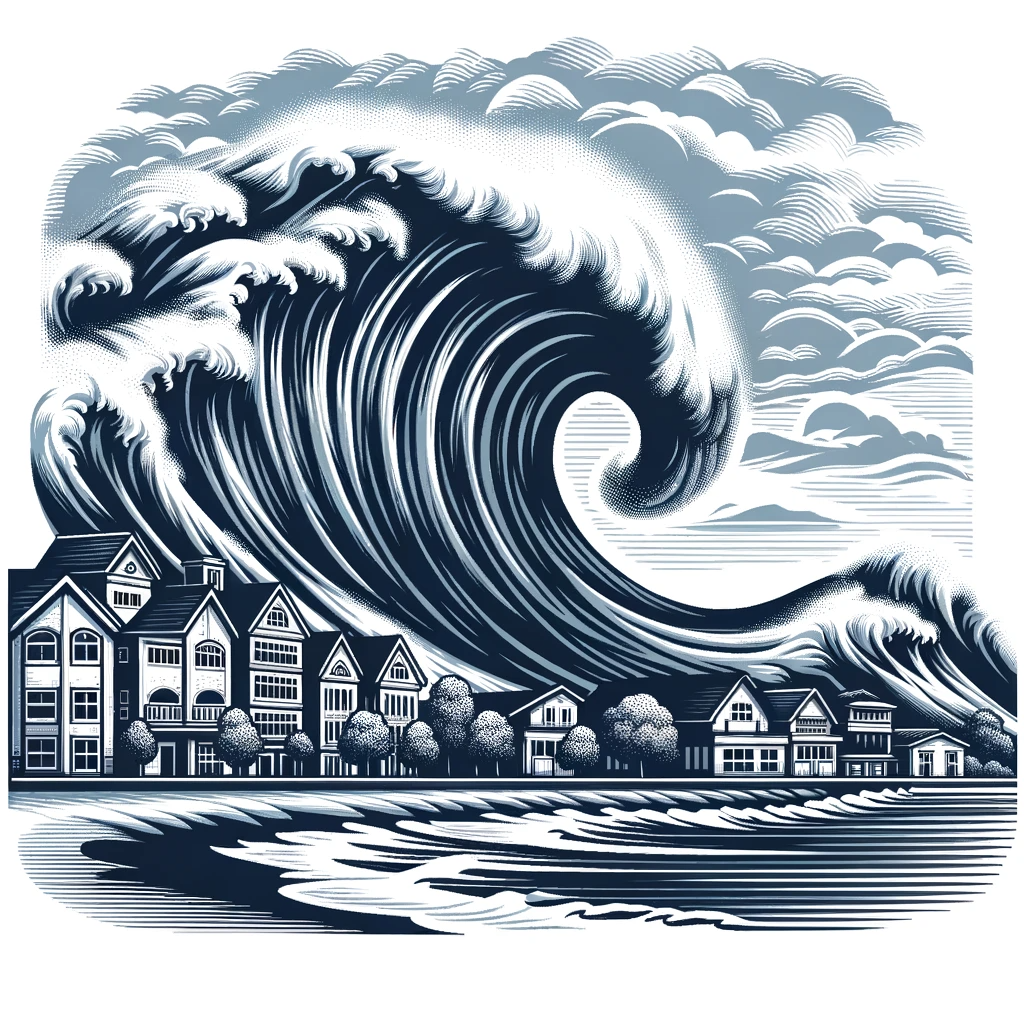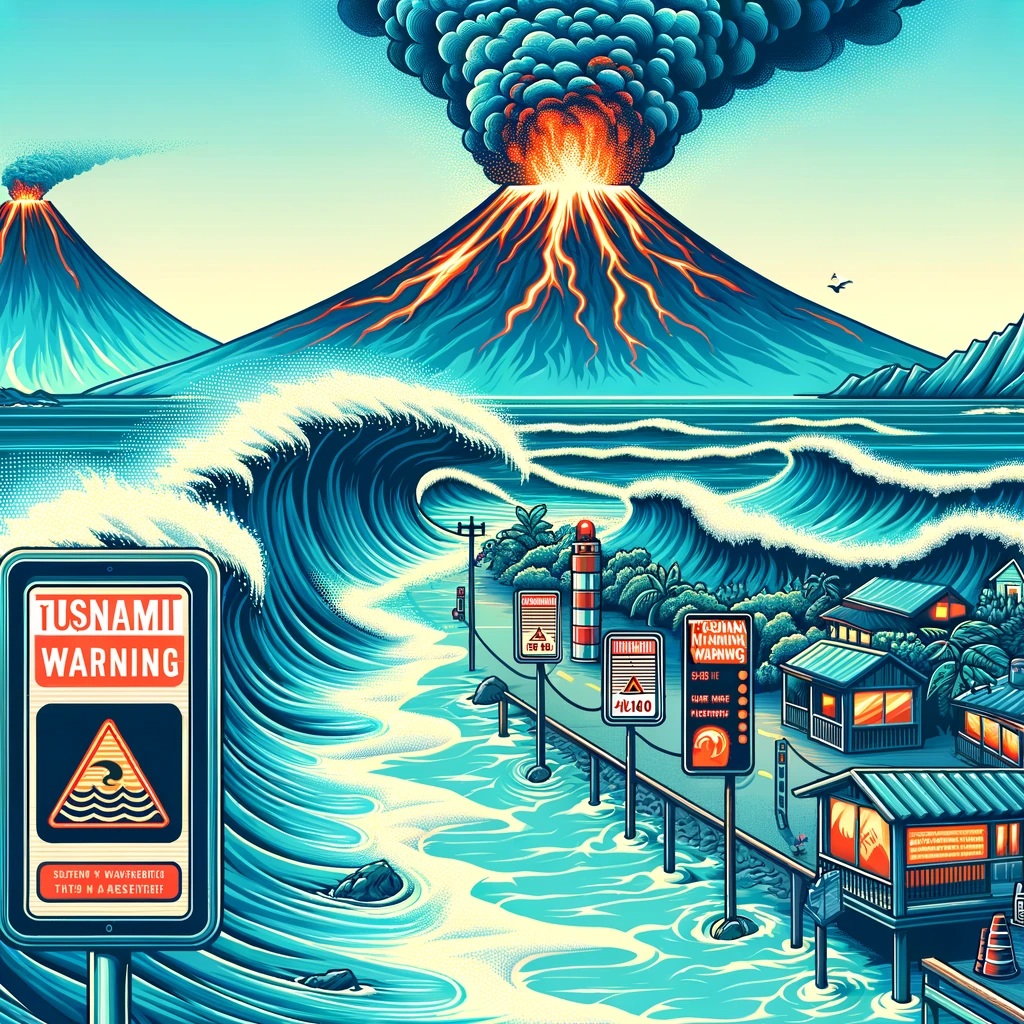Tsunami
Definition
A tsunami is a series of ocean waves with very long wavelengths caused by large-scale disturbances of the ocean, such as: earthquakes, volcanic eruptions, glacier calvings, and meteorite impacts.
Parts of Speech
- Noun
Pronunciation
American English
- IPA Pronunciation: /tsuˈnɑːmi/
- Respelling: tsoo-NAH-mee (with "tsoo" as in "super," "NAH" as in "father," and "mee" as in "me")
British English
- IPA Pronunciation: /tsʊˈnɑːmi/
- Respelling: tsoo-NAH-mee (similar to American English, with "tsoo" closer to "soo" in "soot," "NAH" as in "father," and "mee" like in "me")
In both dialects, "tsunami" is pronounced with the primary stress on the second syllable "NAH." The word begins with a "tsoo" sound, which in British English is slightly closer to the "soo" in "soot." The rest of the word, "NAH-mee," is pronounced similarly in both American and British English.
Etymology
Derived from the Japanese words "tsu" (meaning "harbor") and "nami" (meaning "wave"). The term is used to describe the phenomenon because these waves can be most destructive when they crash ashore, especially in harbors.
Derivatives
- Tsunamic (adjective)
- Tsunamigenic (adjective)
- Tsunamilogy (noun)
- Tsunamite (noun)
- Tsunamal (adjective)
Synonyms
- Tidal wave (though technically inaccurate)
- Seismic sea wave
- Harbor wave (direct translation)
Antonyms
- None
Usage
- "After the earthquake, the coastal towns braced for a potential tsunami."
- "Tsunami warnings were issued across the Pacific following the volcanic eruption."
Related Terms
- Seismograph
- Earthquake
- Richter scale
- Epicenter
- Aftershock
Detailed Definition
Noun
- Large Ocean Wave: A series of large ocean waves generated by sudden disturbances in the near-sea floor, most often earthquakes below or near the ocean floor. These waves can travel across entire ocean basins.
- Example: In 2004, a massive tsunami triggered by an undersea earthquake off the coast of Sumatra in Indonesia resulted in the deaths of over 200,000 people across 14 countries.
- Figurative Surge: In a figurative sense, a sudden and overwhelming surge or outpouring.
- Example: The company faced a tsunami of complaints after launching their controversial ad campaign.
Tsunami


.png)
🇨🇳 Mandarin
- 海啸 (hǎi xiào)
- IPA: /xaɪ̯˥˧ ɕjau̯˥˩/
- Respelling: hai-xiao
🇮🇳 Hindi
- सुनामी (sunāmī)
- IPA: /sʊˈnaːmiː/
- Respelling: su-naa-mee
🇪🇸 Spanish
- Tsunami
- IPA: /tsuˈnami/
- Respelling: tsu-na-mi
🇫🇷 French
- Tsunami
- IPA: /t͡su.na.mi/
- Respelling: tsu-na-mi
🇸🇦 Modern Standard Arabic
- تسونامي (tsūnāmī)
- IPA: /t͡suːˈnaːmiː/
- Respelling: tsu-naa-mee
🇧🇩 Bengali
- সুনামি (sunāmi)
- IPA: /sunami/
- Respelling: su-na-mi
🇷🇺 Russian
- Цунами (tsunami)
- IPA: /t͡sunɐˈmʲi/
- Respelling: tsu-na-mi
🇵🇹 Portuguese
- Tsunami
- IPA: /t͡suˈnɐmi/
- Respelling: tsu-na-mi
🇮🇩 Indonesian
- Tsunami
- IPA: /t͡suˈnami/
- Respelling: tsu-na-mi
🇩🇪 German
- Tsunami
- IPA: /t͡suˈnaːmi/
- Respelling: tsu-naa-mi
🇯🇵 Japanese
- 津波 (tsunami)
- IPA: /t͡sɯᵝna̠mi/
- Respelling: tsu-na-mi
🇻🇳 Vietnamese
- Sóng thần
- IPA: /sɔŋ˧˥ tʰan˧˥/
- Respelling: song than
🇰🇷 Korean
- 쓰나미 (sseunami)
- IPA: /s͈ʰu.na.mi/
- Respelling: sseu-na-mi
🇹🇷 Turkish
- Tsunami
- IPA: /tsunami/
- Respelling: tsu-na-mi
🇵🇰 Urdu
- سونامی (sunāmī)
- IPA: /suˈnaːmiː/
- Respelling: su-naa-mee





